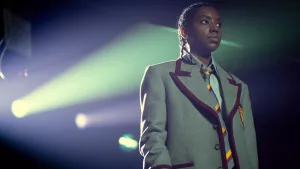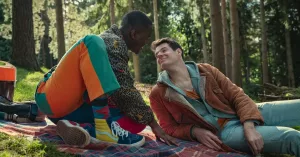'Hawkeye' Episode 5 Review: Rejoice! [SPOILER] is Finally Here
'Hawkeye' episode five features Clint facing his sins, Kate having dinner with an assassin, and the reveal of the long-awaited [SPOILER].
Incluvie Foundation Gala - Learn More
Sex Education is one of the best shows streaming right now for both diversity and depictions of sexual relationships. With every season it gets better and better, and season 3 fleshes out relationships explored in the first two seasons while also introducing brand new diverse characters! While Sex Education does primarily live up to its name (and truly educates!), it also focuses on other kinds of relationships (friendships, parent-child relationships, and romantic relationships) that are treated as equally important. Spoilers ahead for season 3 of Sex Education!

One of the first new relationships introduced this season is the sex with “no strings attached” between Otis (Asa Butterfield) and Ruby (Mimi Keene). This couple has become a fan favorite. Season 3 brings Ruby center stage, developing her beyond the shallow Mean Girl/ Queen Bee archetype she’s been in the past. Luckily, the showrunners didn’t strip her of the traits that some might see as negative to make her more likable. Ruby retains her materialistic nature and her arrogance while also being a responsible daughter who dedicates herself to taking care of her family. She and Otis make a charming couple.
However, Ruby gets all of this character development only for her to be tossed aside in the narrative as Otis tosses her aside. Once Otis breaks up with her, the show stops focusing on Ruby and only shows her from a distance again. The show tries to make up for it by giving her a badass moment in the finale when she fights Hope off for control of the presentation, but it feels kind of cheap. Justice for Ruby!

Another new relationship this season is the romance between Maeve (Emma Mackey) and Isaac (George Robinson). They make a good couple. They challenge each other in ways couples should, calling out their flaws and forcing each other to grow. Maeve challenges Isaac to be more selfless and less rude. Isaac tells her:
“That’s why you give me a hard time, more than anyone else, because you know that’s what is going to make me feel seen.”
And Isaac challenges Maeve to be less prideful and accept help. He celebrates all of her accomplishments. (Meanwhile, Otis doesn’t do this enough. He can barely congratulate her at the season’s end when she leaves for America because all he can think about is the future of their relationship.)
Maeve and Isaac’s intimate moment is also the first time I’ve seen any exploration of sex for a person with a disability. The way Maeve and Isaac gently explore what contact they enjoy while consistently asking for consent was beautiful to see. Moreover, it was genuinely educational, and not in a forced fashion.
Unfortunately, like what happened to Ruby, once Maeve breaks up with Isaac to be with Otis, he fades to the background again. Like Ruby, I want to see more of Isaac and his life. But this show isn’t about him.

And that’s my one and only critique of Sex Education. It staunchly sticks to its two leads: Otis and Maeve. But they have the most boring relationship in the entire show. If the showrunners could stop centering white, cishet relationships, the show would be all the better for it. By the season’s end, the Otis-Maeve relationship feels forced, having been dragged out (and it looks like it will continue to be dragged out). Maeve and Otis fall into the trope almost all mainstream shows have, which is the “two white cishet protagonists who are supposed to end up together.” I’m really tired of seeing that. This show features so many relationships that stray from that norm. Since this show is about sex education, and the public has definitely been (and continues to be) educated on sex and romance between cishet white people since the birth of TV and film, why not focus on underrepresented relationships more?

One of those underrepresented relationships featured in the show is between Jackson (Kedar Williams-Stirling) and Cal (Dua Saleh). Cal is another new addition, a nonbinary Black character who befriends Jackson. Cal is an amazing example of a relatively in-depth exploration of the nonbinary identity. Cal faces gendered uniforms and sex ed classes and stands up against it all. Beyond gendered clothing, they have an uncomfortable relationship with tight clothes, wishing to wear things that don’t feel baggy or expose their body. Cal is confused yet confident, a combination that many nonbinary viewers may relate to (and admire for the latter).
Jackson likes Cal, but Jackson is straight and has trouble accepting Cal’s identity. This leads to them “breaking up,” but still being friends. Cal has a great line that exemplifies a lot of queer people’s experiences dating straight partners or anyone who is only starting to learn about and accept queer identities:
“I’m still figuring out so much shit about myself. I can’t carry you, too.”

Eric (Ncuti Gatwa) and Adam (Connor Swindells), meanwhile, go through a lot this season. The pair begin in the honeymoon phase and end the season broken up. Eric and Adam are going in two different directions. Eric is an out and proud gay man who wants to start going to gay bars, dressing up, and joining the community. Adam, on the other hand, may have come out to the school, but still struggles coming out to his family. He likes putting on makeup only in private and doesn’t feel comfortable with flamboyance as Eric does.
Eric’s journey to Nigeria was a wonderful way for him to get in touch with his roots, reunite with his family and culture, and discover that even in Nigeria — where being gay is a crime — there is a vibrant underground LGBT+ community. This causes Eric to realize he wants more than Adam is willing to give right now, and that is why they break up. It’s heartbreaking to watch, especially since it’s clear Adam loves Eric so much and this is his first boyfriend. But this is a decision that make sense.

Another important relationship that is always wonderful to see is Eric and Otis’s friendship. Two things in particular are great about them: 1. They are unabashedly physically intimate. They touch and hug and hold each other all the time in ways that always seem so genuine and are filled with such pure love for each other. 2. They are emotionally intimate, too. Otis openly sobs in front of Eric when he thinks his mother might die, and Eric holds onto him. The two share all of their secrets with each other and never treat the other with shame. It’s the kind of relationship young men and boys should aspire to have when the real life patriarchy shames them for sharing emotions and allowing themselves to be vulnerable in front of others (like what happened to Adam and Michael.)
Sex Education Season 3 gets a 5/5 Incluvie score and 5/5 General score. It features an amazing amount of positive diversity, from sexuality to gender identity to race and ethnicity. It addresses complex topics with care and nuance, like Cal facing the gender binary in uniforms and sex ed and Viv facing tokenism in academics. Most importantly, this show treats the characters and their issues with respect.
You can watch Sex Education on Netflix now.
Related lists created by the same author
'Hawkeye' episode five features Clint facing his sins, Kate having dinner with an assassin, and the reveal of the long-awaited [SPOILER].
Related diversity category
Inuit girls use their Inuit tradition to hunt down alien monsters, enough said.
Related movie/TV/List/Topic
This Netflix original series is for animal lovers and fans of light horror series.